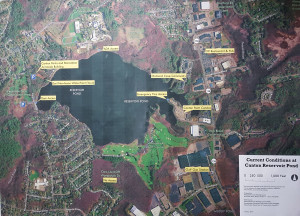Residents dive headfirst into Rez debate at forum
By Jay TurnerAn air of skepticism about the town’s ability to manage Reservoir Pond permeated the library’s community room on Saturday during a public “listening session” on future uses and access to the popular town-owned recreation spot.
Approximately 60 residents, roughly half abutters and half non-abutters, turned out for the January 30 forum, which was hosted by the Massachusetts Area Planning Council (MAPC) in conjunction with the Canton Board of Selectmen.
In August, the BOS, partly in response to complaints about the lack of public access to the reservoir since the town assumed ownership in late 2012, hired MAPC to study existing conditions at the pond and develop a summary of potential uses and their impacts. The MAPC will then report back to the selectmen with its recommendations, which will then be used to develop a long-term use plan for the pond — conceivably in time for the upcoming May town meeting.
MAPC senior regional planner Sam Cleaves, who facilitated the event, stressed that the agency was still in the fact-finding stage and came into the listening session with “no set outcomes” and “no agenda.”
“Our goal is to try and identify the issues and start to develop a consensus and a middle ground,” noted Cleaves.
To that end, he and colleague Mark Racicot, director of land use planning for MAPC, conducted an electronic polling exercise during the forum and shared the results with the audience in real time.
What the polling exercise revealed, despite several complaints about the wording and ambiguity of the questions, is that residents remain sharply divided on a number of key issues, most notably the use of motorized boats on the pond — which are currently banned for all non-abutters — as well as the need for improved and expanded public access.
Respondents were split, for instance, on the question of whether they supported the use of boats with motors up to 30hp, and they were similarly divided when asked if they would support using town funds to build a waterfront facility such as a boat ramp or boat washing station.
At the same time, both abutters and non-abutters managed to find some common ground during the two-plus-hour meeting.
Perhaps most notably, the great majority of the attendees indicated that they would prefer to limit pond access to Canton residents only, and 70 percent said they would not want to use state funding or grants to build an improved public waterfront facility if it meant permitting access to all Massachusetts residents.
Meanwhile, both abutters and non-abutters expressed grave concerns about the town’s ability to control invasive plant species, and residents on both sides of the aisle suggested that the town takeover of the reservoir was actually the source of the current problems.
With respect to weed control, the general consensus was that the nonprofit Reservoir Pond Preservation Association, which has been funding the weed management operation for decades with private donations from abutters, is best equipped to handle this responsibility in the future. However, George Comeau, a non-abutter and a vocal leader of the “Free the Rez” social media campaign, said the process should at least be more collaborative and inclusive.
“I don’t think weed control buys you access,” said Comeau. “I think it buys you a better environment, and so if we want a better environment we all need to share in this public resource.”
Comeau said whatever rules are eventually put in place need to be fair and equitable for all residents — a statement that was echoed by several non-abutters during the public comment portion of the meeting.
One longtime resident called for “decent, reasonable access” to the pond for small boats in addition to light trailer access. “As a practical matter,” he said, “the only people that have had access to the pond are the [Mass.] Hospital School beachfront area and the people who live there and that’s it, and its not fair to the townspeople.”
Others asked for the return of parking and boater access along the Pleasant Street dam, which was declared off limits beginning in the summer of 2014. Some said they would be happy to pay for an annual permit in order to access the pond by boat.
Other suggestions from residents included the creation of a designated public swimming area; expansion of the open season at the Earl Newhouse waterfront beyond November 1; addition of a police presence or a Recreation Department staff member at the pond; creation of a sailing program for kids; and restoration of stream flow below the Pleasant Street dam.

An aerial image of the reservoir showing current conditions, presented at the forum by MAPC (click to enlarge)
As for the roughly two dozen abutters who attended the meeting, the majority appeared to be in favor of preserving the status quo, including the present ban on motorized watercraft for all other residents.
Some said the pond, at approximately 300 acres, is simply too small to handle the additional boats, citing safety and enforcement concerns.
Denise Arsenault, who lives near the pond but is not a direct abutter, said the people who own waterfront property deserve the added boating rights because they paid a premium for their real estate. “So it is fair,” she said. “They’re paying more money for their real estate, they get an extra sort of benefit from it, and they are liable for themselves when they put their watercraft on there.”
Henry Krueger, who also lives near the pond, said the “entire character” of the reservoir would change if some of the residents’ suggestions were implemented, and he urged the town to “slow down” and to tread very carefully with any proposed rule changes.
“I don’t think that the intent at the [2011] town meeting was for all of this to change … just because the town took ownership of it,” he said. “And I’m deeply concerned that once it starts it’s not going to stop.”
Kathy McCormack, speaking as a non-abutter, also faulted the town for the access issues and asked that they “restore everything to the way that it was.”
“When we took that town meeting vote to take over ownership, it changed to trying to block the public access that the public had been enjoying down there problem-free for decades,” she said. “I wouldn’t have voted at that town meeting for the town to take it over if they weren’t going to let the town use it.”
Despite the criticisms from both abutters and non-abutters, Selectman Bob Burr, who attended the meeting along with colleague Kevin Feeney, asked the public to be patient and pledged to work toward a solution that’s best for the entire community.
Burr said that is precisely why the BOS turned to a team of professionals from the MAPC, so that “at the end of the day, we can come up with [a plan] that’s in the best interests of 21,000 people.”
As for the seemingly popular idea of restricting access to Canton residents only, Cleaves said that is still an option; however, it would require the selectmen to dispute the reservoir’s status as a “great pond” as defined by the Department of Environmental Protection. Unless special legislation is passed to that effect, Cleaves said the general public will retain the right to access the area by foot “over public or private property for fishing, fowling and navigation.”
In the meantime, Cleaves said the MAPC will continue to gather data and examine appropriate uses for Reservoir Pond with the goal of completing its report by the end of March.
“Understandably there’s a lot of confusion right now, but just bear with us,” he said. “We’re behind you. I know that you guys want an answer to this probably, you know, three weeks ago, but we’re in the process of trying to gather information as best as we can and your input today is really valuable.”
Short URL: https://www.thecantoncitizen.com/?p=32307











